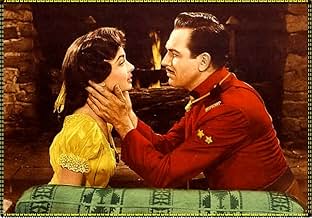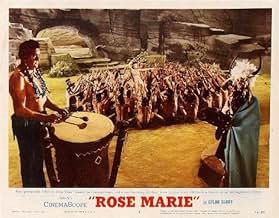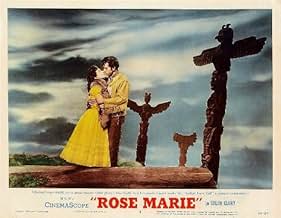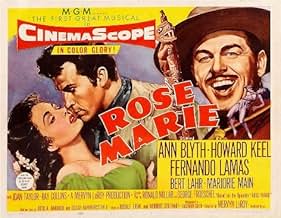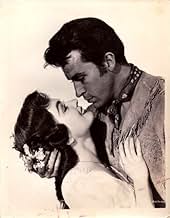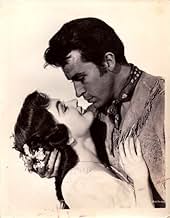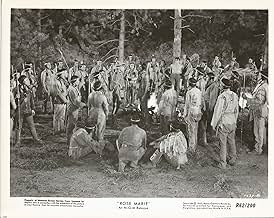Aggiungi una trama nella tua linguaWilderness girl Rose Marie has adventures in life and love when Mountie Mike Malone takes her out of the wild.Wilderness girl Rose Marie has adventures in life and love when Mountie Mike Malone takes her out of the wild.Wilderness girl Rose Marie has adventures in life and love when Mountie Mike Malone takes her out of the wild.
- Regia
- Sceneggiatura
- Star
Dorothy Adams
- Townswoman
- (non citato nei titoli originali)
Fred Aldrich
- Woodsman in Saloon
- (non citato nei titoli originali)
Robert Anderson
- Corporal
- (non citato nei titoli originali)
John Angelo
- Man at Charity Dance
- (non citato nei titoli originali)
Emile Avery
- Mountie
- (non citato nei titoli originali)
Walter Bacon
- Man at Charity Dance
- (non citato nei titoli originali)
Al Bain
- Woodsman in Saloon
- (non citato nei titoli originali)
Margaret Bert
- Townswoman
- (non citato nei titoli originali)
Chris Willow Bird
- Indian
- (non citato nei titoli originali)
Oscar Blank
- Woodsman in Saloon
- (non citato nei titoli originali)
Recensioni in evidenza
In this third film of Rose Marie and probably the last one we'll ever see, every single version of the film is different to each other and to the plot of the original Broadway show. Since operettas are a thing of the past I doubt another version would be made. Where would you get voices like Ann Blyth, Howard Keel and Fernando Lamas?
This version has Ann Blyth as Rose Marie, a trapper's daughter now alone out in the woods. Though she's pretty capable of taking care of herself, those in authority don't see it that way. Mountie Howard Keel brings her into what passes for civilization in the Canadian west at the turn of the last century.
Keel's seeing Ann in a whole different light when she puts on a dress, but trapper Fernando Lamas will take her any old way, so Ann's got to choose between them.
The main songs from the 1936 version make it here, you couldn't really do Rose Marie without Indian Love Call, The Mountie Song or the title number. Rudolf Friml wrote some other nice songs for the original Broadway production which didn't make it into the classic Nelson Eddy/ Jeanette MacDonald version or this one.
Friml contributed some new songs in what would turn out to be his next to last songwriting assignment and they're well suited for the voices that have to sing them. Otto Harbach and Oscar Hammerstein, II did the original lyrics for Broadway, but in this Paul Francis Webster collaborated with Friml and provided the words.
For comic relief we have Marjorie Main and Bert Lahr, playing something along the lines of a cowardly Mountie. But actually he proves to be of invaluable help to Howard Keel.
Keel in his memoirs was not originally satisfied with the Mountie part, feeling he was written like a Dudley DooRight idiot in the first draft. Some considerable rewriting was done before he went before the camera.
He also tells of a practical joke that second unit director Howard Koch pulled on director Mervyn LeRoy by having Jack Benny show up in a Mountie uniform and mess up the takes of the Mountie Song. Benny and LeRoy were good friends and when LeRoy realized who it was, he broke up and shooting was done for the day.
Busby Berkeley got some work in this film, staging the Totem Tom Tom number. There are words to the song, but you won't hear any in this or in the earlier one. Totem Tom Tom is nicely choreographed. I'm always amazed at how Rudolf Friml who studied under Anton Dvorak in Prague before coming to America was able to capture the American Indian rhythm with that song.
This 1954 version of Rose Marie has enough merit to it that it does not suffer comparison with what Nelson and Jeanette did back in the day. Fans of operetta will like it, even devoted Eddy/Mac people.
This version has Ann Blyth as Rose Marie, a trapper's daughter now alone out in the woods. Though she's pretty capable of taking care of herself, those in authority don't see it that way. Mountie Howard Keel brings her into what passes for civilization in the Canadian west at the turn of the last century.
Keel's seeing Ann in a whole different light when she puts on a dress, but trapper Fernando Lamas will take her any old way, so Ann's got to choose between them.
The main songs from the 1936 version make it here, you couldn't really do Rose Marie without Indian Love Call, The Mountie Song or the title number. Rudolf Friml wrote some other nice songs for the original Broadway production which didn't make it into the classic Nelson Eddy/ Jeanette MacDonald version or this one.
Friml contributed some new songs in what would turn out to be his next to last songwriting assignment and they're well suited for the voices that have to sing them. Otto Harbach and Oscar Hammerstein, II did the original lyrics for Broadway, but in this Paul Francis Webster collaborated with Friml and provided the words.
For comic relief we have Marjorie Main and Bert Lahr, playing something along the lines of a cowardly Mountie. But actually he proves to be of invaluable help to Howard Keel.
Keel in his memoirs was not originally satisfied with the Mountie part, feeling he was written like a Dudley DooRight idiot in the first draft. Some considerable rewriting was done before he went before the camera.
He also tells of a practical joke that second unit director Howard Koch pulled on director Mervyn LeRoy by having Jack Benny show up in a Mountie uniform and mess up the takes of the Mountie Song. Benny and LeRoy were good friends and when LeRoy realized who it was, he broke up and shooting was done for the day.
Busby Berkeley got some work in this film, staging the Totem Tom Tom number. There are words to the song, but you won't hear any in this or in the earlier one. Totem Tom Tom is nicely choreographed. I'm always amazed at how Rudolf Friml who studied under Anton Dvorak in Prague before coming to America was able to capture the American Indian rhythm with that song.
This 1954 version of Rose Marie has enough merit to it that it does not suffer comparison with what Nelson and Jeanette did back in the day. Fans of operetta will like it, even devoted Eddy/Mac people.
when i saw Rose Marie i fell in love with it. it is a fantastic love story done in the mountains and with great songs, Indian Love Call is one of the best love songs i have heard. The scenery in the movie is to make you want more and want to be their. It is a fantastically done movie and the combination of Howard Keel and Ann Blyth was the best for this movie, since i saw this movie in 1955 i have never forgotten it and I have been looking for either a video or a DVD of this movie for many years. Please, please lets put this fantastic movie on DVD so that i may have a copy to join my other musicals of that era. They do not make movies like these any more. So again i beg of you please, please put with wonderfully fantastic movie on to DVD, so those of us who want it so much can have it.
MGM's first CinemaScope musical is pictorially splendid, with what looks like on-location shooting of the Canadian wilderness, or a very good faking thereof. The lake and mountain vistas must have been spectacular on the big screen; even on a TV screen they're impressive. Also, the screenwriters dump the pretensions that marred the 1936 Nelson-Jeannette version and return closer to the 1924 stage story, streamlining it nicely and removing some of the clunkiness in the dialog. Only a handful of the original Friml-Harbach-Hammerstein-Stothart songs survive, but several of the new ones are by Friml, too (with lyrics by Paul Francis Webster), and one, "I Have the Love," is quite nice. Ann Blyth, while not credibly a backwoods French-Canadian, is lovely and with a fine set of soprano pipes, and Howard Keel reminds us again of how Hollywood underrated him--one of our most masculine musical leading men, with an easy understated acting style to back up his booming vocals. Fernando Lamas hasn't that much to do, and it feels unfair that one of Ms. Blyth's leading men has to be a good sport and just step back and let her love the other. And Bert Lahr may be a comic genius, but his and Marjorie Main's material is so rotten that you tend to forget it. Still, a couple of soundstage scenes aside, it's a gorgeous big-screen production, and not as dramatically inert as many other operetta-derived musicals. A very pleasant 107 minutes.
I watched this film and began to wonder why it was not working for me. I found it depressing and the more the film entered into the domain of hanging and murder, and the dark side of Fernando Lamas's relationship with a Native American woman and its terrible consequences I sort of turned off. I liked the film years ago and I am still enchanted by Ann Blyth's performance. Howard Keel less so and comparing his performance in ' Calamity Jane, ' which is a masterpiece of film making, I found him too overbearing and heavy. Fernando Lamas I liked, but even he had lost something of his blatant charm. I finally decided it was Mervyn LeRoy ( fine for his gangster films like ' Little Caesar ' ) but not for musicals. As the first Cinemascope film musical and despite its success I found it lacking in that light touch that the genre needs. One example and no spoilers the Busby Berkeley seemed loaded with threat towards the woman involved, and for me it left a nasty taste in the mouth of female exploitation and a sort of prelude to the violence to come. I am fully aware it must have been thrilling to watch in 1954 as many in the audience would have been old enough to see it in two previous versions. That said it is worth seeing, but in my opinion the dark taste remains.
Saw this on a massive CinemaScope screen during its first-run release at the Egyptian Theater in Hollywood, California. If memory serves (since I haven't caught it on a Turner Classic Movies broadcast recently) it was enjoyable and nicely mounted, although I seem to recall that a lot of it was done on some massive MGM soundstages rather than outdoors in the northern California and Canadian locations. Of course that was usually the case with musicals with outdoor settings. Technical considerations prompted the studios to go the easy route of utilizing the more easily controlled environments of, in MGM's case, their Culver City, Calif. lot and stages subbing for the great outdoors. Howard Keel and Ann Blyth (and Fernando Lamas, too) acquitted themselves quite nicely in the vocal department. And any movie that gives us Marjorie Main and Bert Lahr for some expert comic relief is to be fondly remembered. Although its popularity may not merit it, it would be nice to add a DVD version, not yet available, it appears, of this widescreen/stereo remake to one's video library.
Lo sapevi?
- QuizJoan Crawford, who played Ann Blyth's mother in Il romanzo di Mildred (1945), played the title role in the original 1928 version of this film, which is now considered lost.
- BlooperContrary to what is written on the DVD jewel-box, the "Totem Tom-Tom" number doesn't appear in this version of the operetta. It was replaced by the Totem Dance that is seen in the film.
- Colonne sonoreRose Marie
Music by Rudolf Friml
Original Lyrics by Otto A. Harbach and Oscar Hammerstein II
Revised Lyrics by Paul Francis Webster
Performed by Howard Keel; reprised by Bill Lee and the Mounties
I più visti
Accedi per valutare e creare un elenco di titoli salvati per ottenere consigli personalizzati
- How long is Rose Marie?Powered by Alexa
Dettagli
- Tempo di esecuzione1 ora 44 minuti
Contribuisci a questa pagina
Suggerisci una modifica o aggiungi i contenuti mancanti

Divario superiore
By what name was Rose Marie (1954) officially released in India in English?
Rispondi

